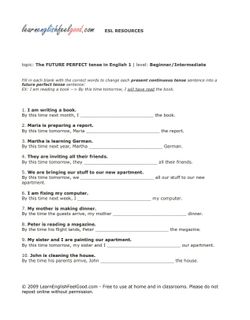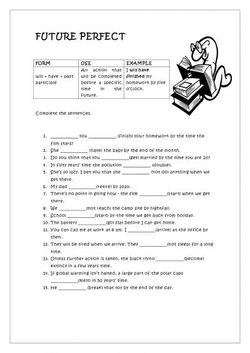Feb 23, 2022
Future Perfect Tense Notes
FUTURE PERFECT TENSE
🤓Key words: Will have
What do the words mean?
Future - (etymology)"that is yet to be; pertaining to a time after the present,going to be, yet to be." Origin: Latin
Perfect - "finished, completed, excellent, accomplished, exquisite, lacking in no way" Origin: French
Tense - denotes time, period of time, era or opportunity
👩🎓 Future Perfect Tense refers to an action that will be completed before another action begins in the future.
😃USES
1. It is used to express an action which will happen/occur in future and will be
completed by a certain time in future.
☆We use the future perfect to say that something will be finished by a particular time in the future.
☆We do not know when that particular action will be completed, because the FUTURE is UNKNOWN.
📖Examples
• By 10 o'clock, I will have finished my homework. (= I will finish my homework some time before 10, but we don't know exactly when.)
• By the time I'm sixty, I will have retired. (= I will retire sometime before I'm sixty. Maybe when I'm fifty-nine, maybe when I'm fifty-two.)
2. We use the future perfect to say 'how long' for an action that starts before and continues up to another action or time in the future.
📖Examples
• When we get married, I'll have known Robert for four years.
• At 4 o'clock, I'll have been in this office for 24 hours.
3. It is often used with a time expression beginning with by; by then, by that time, by midnight, by the end of the year.
☆The time can also be given by other time expressions (on Sunday, before 31 June) or other activities expressed in different future tenses.
📖Examples
•I will have sent the project by Friday.
•On 11 August this year we will have been married for five years.
•When the mountaineers get back to the base, they'll have been in the snowstorm for two days.
•We'll have reached the top before noon.
•How long will she have worked here by the end of this year?
FORM
💡The general rule is = will have + past participle(+ed ending for regular verbs/different words for irregular verbs)
Positive sentence
✅I will have painted
✅I will have written
✅He will have painted
✅He will have written
Contractions -> I will have = I'll have
Negative sentence:
✅I will not have painted
✅He will not have painted
Contraction-> I will not have = I won't have
Question/Interrogative sentence:
✅Will you have painted?
✅Will you not have painted?

